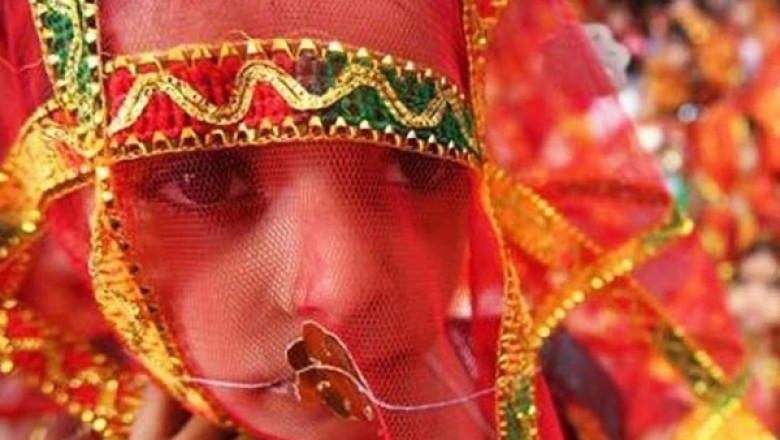views
In recent developments that have reignited a complex debate in Pakistan, the law setting the minimum age for marriage for girls has once again been challenged in the Federal Shariat Court (FSC). This legal move seeks to review and potentially nullify certain provisions of provincial child marriage laws, particularly those implemented in Sindh under the Sindh Child Marriage Restraint Act 2013. The challenge brings to the forefront the enduring conflict between evolving social legislation and interpretations of Islamic jurisprudence in the country.
Background: The Law and Its Intent
Pakistan’s federal and provincial governments have taken legislative steps to curtail child marriage, an issue that poses severe threats to the well-being and future of young girls. The Sindh Child Marriage Restraint Act 2013 is particularly notable, as it prohibits marriage under the age of 18 for both boys and girls. Violations of this law can lead to legal penalties, including imprisonment and fines. The law was hailed by human rights organizations as a progressive move towards protecting minors from forced and premature marriages, which often result in severe physical and emotional consequences, including interrupted education, early pregnancies, and domestic abuse.
The Legal Challenge
The current challenge stems from the argument that setting a fixed minimum marriageable age contradicts Islamic principles. The petitioner, Ali Azhar, who came into the spotlight during the controversial marriage case involving Arzoo Raja—a teenage Christian girl who allegedly converted to Islam and married Azhar—has claimed that the age restriction set by the law is not rooted in Islamic teachings. His legal team argues that once an individual has reached puberty, they are eligible for marriage under Shariah, and thus any legal restriction beyond that constitutes an infringement on religious freedoms.
The case puts forth a challenge to Sections 2-A and 8 of the Sindh law, which outline the minimum age and penal actions for violations. According to the petitioner, these provisions go beyond what Islamic jurisprudence prescribes and should be considered un-Islamic.
The Federal Shariat Court’s Previous Stance
This is not the first time the FSC has been asked to consider such a matter. In March 2023, the Court dismissed a similar petition that sought to overturn parts of the Sindh Child Marriage Restraint Act 2013. At that time, the court ruled that setting a minimum age for marriage did not contradict Islamic teachings. The bench observed that Islamic law gives the state the authority to legislate on matters in the public interest, especially when it comes to safeguarding the rights and welfare of minors.
The court emphasized that the Quran and Hadith do not provide a fixed age for marriage, but stress maturity, consent, and capability. Therefore, if the state determines 18 to be a suitable age based on societal and developmental indicators, such legislation falls within the realm of Maslahah (public interest), a principle well-accepted in Islamic jurisprudence.
The Arzoo Raja Case: A Catalyst
The current petition is closely linked to the controversial case of Arzoo Raja, a minor Christian girl from Karachi who reportedly converted to Islam and married Ali Azhar. Her case sparked national outrage, especially after the Sindh High Court declared the marriage null and void on the grounds that Arzoo was underage and unable to provide legal consent. The matter had significant religious, legal, and communal implications, and the court’s decision to uphold the child marriage law was considered a critical precedent.
Azhar’s legal challenge to the law is now being interpreted by many as an attempt to overturn the legal setback he suffered in the Arzoo case.
Social Implications and the Role of Religion
Child marriage remains a prevalent issue in many parts of Pakistan, often perpetuated by poverty, lack of education, and entrenched patriarchal norms. According to UNICEF, nearly 18% of girls in Pakistan are married before the age of 18. Efforts to legislate against this practice face continuous resistance, particularly when laws are perceived to conflict with religious or cultural traditions.
Opponents of child marriage argue that Islam, in its true essence, encourages the protection, education, and empowerment of young girls. Religious scholars, including many aligned with progressive Islamic interpretations, have increasingly supported legislative efforts that prevent harm to minors, emphasizing that Islam does not condone coercion or harm under the guise of marriage.
Conclusion
As the Federal Shariat Court considers this latest challenge, it once again stands at the intersection of religion and law. Its decision will have far-reaching consequences for the legal status of child marriage laws in Pakistan and could either reinforce or undermine the state’s ability to legislate for the protection of minors. Regardless of the outcome, the debate highlights the need for a nuanced and context-sensitive interpretation of both Islamic principles and human rights legislation—one that balances faith, law, and the protection of vulnerable populations.
Reference: کم عمر لڑکی کی شادی سے متعلق قانون فیڈرل شریعت کورٹ میں چیلنج














Comments
0 comment